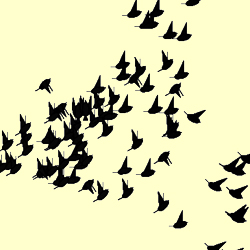 Today, Chris Landau sent me a link to his Master's Thesis entitled The Flocking Party. Chris is in the MFA department at the University of Michigan in Ann Arbor. This a fascinating online production that describes one week in the life of two fictional young scientists, Frank, and his brother, Calvin, as presented in Frank's online journal. This very basic science fiction story takes place in the near future in the lab of the shadowy Doctor Harp: in the year 2035, Frank is studying invasive bird species that have been infected by the mysterious Hebbets virus. Hebbets virus is an innovative nanotechnology that allows infected birds and humans to communicate and organize themselves in ways never before seen. Eventually, a Hebbets-infected Frank, in combination with a similarly infected English sparrow named Arpa, form a new political party, the Flocking Party.
Today, Chris Landau sent me a link to his Master's Thesis entitled The Flocking Party. Chris is in the MFA department at the University of Michigan in Ann Arbor. This a fascinating online production that describes one week in the life of two fictional young scientists, Frank, and his brother, Calvin, as presented in Frank's online journal. This very basic science fiction story takes place in the near future in the lab of the shadowy Doctor Harp: in the year 2035, Frank is studying invasive bird species that have been infected by the mysterious Hebbets virus. Hebbets virus is an innovative nanotechnology that allows infected birds and humans to communicate and organize themselves in ways never before seen. Eventually, a Hebbets-infected Frank, in combination with a similarly infected English sparrow named Arpa, form a new political party, the Flocking Party.
The art, animations and musical score are fabulous, especially on page 8, which describes the spread of European Starlings across North America from New York City's Central Park, where they were introduced in 1890. Mousing over and clicking on the red dots are key to following this story.
After you've interacted with his production, I think you'll be absolutely fascinated by Chris's blog that documents the thought process that contributed to the design. Incidentally, Chris will be checking your comments periodically and will answer any questions you might have.
(Best viewed with Safari or the evil Explorer)

This is absolutely amazing! I've bookmarked it and will take some more time exploring it. I wonder if he's read Will Baker's "Shadow Hunters" - it is not just birds, but everything from insects to large mammals....
I've been wondering for a while if whatever made Homo sapiens suddenly become intelligent might be some odd chunk of DNA spread laterally (virus, bacteria, mitochondrial code) that might be spreading in other species as well (albeit lacking thumbs and vocal apparatus). It's been seeming that the more we look into 'animal intelligence' the more we find -- might it be because it's actually increasing along the same lines that of our species did, all of a sudden?
Let's hope so. I also keep remembering the English reporter who asked "What do you think of Western civilization, Mr. Gandhi?" and Gandhi's reply "I think that it would be a good idea."
What do you think of intelligent life on Earth?
The virus-carried gene that results in speciation has been brilliantly exploited in Greg Bear's novels "Darwin's Radio" and "Darwin's Children" - the best hard SF published in recent years.
One great thing about doing this project has been all of the literature that people throw my way. I have not read most of this stuff and can't wait for this summer and onwards to soak it up.
As for intelligence in Homo Sapiens, I don't think it was a bug (In a biological sense). Animals are also really smart. They have been so for a long long time. All of the tools for culture manipulation are built on the tools of wayfinding and problem solving. We are, after all, still just lucky ape's.
We could think of language and art (why we are such lucky apes) as this bug that "hank" talks about. It enabled a new organism to emerge: CULTURE. You can call it civilization, but it is still very organic. Even laws are like hormones secreted by a pituitary gland, affecting the rest of the culturo-chemical hormones in this new organism.
Along the same lines, I have some reading suggestions of my own "A Thousand Years of Nonlinear History" by Manuel DeLanda and "A Thousand Plateaus" by Gilles Deleuze and Felix Guattari. They aren't fiction, but they address the way stories function in our culture. The overarching goal of their work is to help us to see human processes as part of a biological and geological ordering of our planet.
Chris Landau (producer of The Flocking Party)
Thanks GrrlScientist -- This is a great site! And hank, I think the reasons why animals 'seem more intelligent' is because our paradigms have become more permissive about recognizing their smarts (and we have miles to go, imho). For example, as I'm sure Grrl knows very well, one of the reasons Irene Pepperberg set out to train Alex was to debunk the notion that animals couldn't "count." It took a long time for people to accept Jane Goodall's findings in the 60s that chimps used tools -- and then they said, well, it was just those chimps (since falsified), and now gorillas and some birds "allowed" tool use too. Western science has used excuses like: animals can't feel pain, they can't think, they can't use tools, and so on -- the final and biggest one, they don't have "language," is next up, I hope!